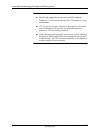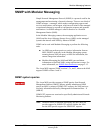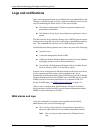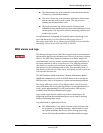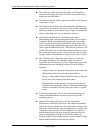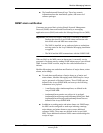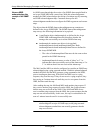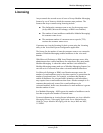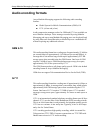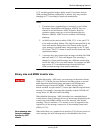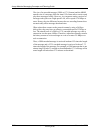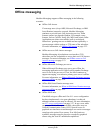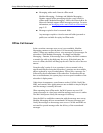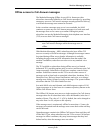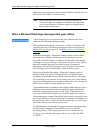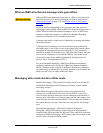
Avaya Modular Messaging Concepts and Planning Guide
5-18 November 2004
Avaya Modular Messaging Concepts and
Planning Guide
Audio encoding formats
Avaya Modular Messaging supports the following audio encoding
formats:
! Global System for Mobile Communications (GSM) 6.10
! G.711 (A-law and µ-law)
Audio compression manager codecs for GSM and G.711 are available on
most Windows desktops. Voice messages recorded by using Modular
Messaging and sent to non-Modular Messaging users can be played back
by using Microsoft Sound Recorder or Media Player on a multimedia PC
without requiring any additional software.
GSM 6.10
This audio encoding format has a coding rate of approximately 13 kilobits
per second (kbps) or approximately 1.6 Kilobytes per second (KBps). A
message that is one minute long would require approximately 95.2 KB
storage space when encoded using the GSM format. One hour of GSM
requires 5.6 MB of space. GSM-encoded messages occupy less space,
approximately 20% of the space used by G.711.
The GSM format produces cell phone quality speech. GSM is the default
encoding format in Avaya Modular Messaging.
GSM does not support Telecommunication Device for the Deaf (TDD).
G.7 11
This audio encoding format has a coding rate of approximately 64 kbps or
approximately 8 KBps. A message that is one minute long would require
approximately 468.8 KB storage space when encoded using the G.711
format. One hour of G.711 requires 27.5 MB of space. G.711-encoded
messages occupy more space, approximately five times as much space as
GSM.
G.711 is an international standard telephony encoding format on a 64 kbps
channel. G.711 uses the Pulse Code Modulation (PCM) encoding scheme.
This is an 8-bit format that is used primarily for telephone quality speech.
G.711 has two variants: A-law and µ-law. Typically, A-law is for Europe
and µ-law for United States.
G.711 encoding produces high-quality recording, which is essential for
Teletypewriter (TTY)/TDD. Customer systems that use TTY/TDD with
Baudot tones must use G.711 audio encoding.



